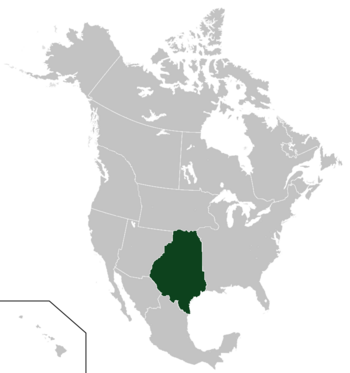Texas (Disunited States)
This article or section is in the process of an expansion or major restructuring. You are welcome to assist in its construction by editing it as well. If this article or section has not been edited in several days, please remove this template. If you are the editor who added this template and you are actively editing, please be sure to replace this template with {{in use}} during the active editing session. Click on the link for template parameters to use.
This article was last edited by Fizzyflapjack (talk | contribs). (Update) |
Federal Republic of Texas | |
|---|---|
|
Motto: "Friendship and Courage" | |
|
Anthem: Texas, our Texas | |
 Location of Texas | |
| Capital | Austin |
| Largest city | Houston |
| Official languages | English |
| Recognized languages |
Spanish French |
| Demonym(s) | Texan |
| Government | Federal Semi-Presdential Constitutional Republic |
| Jack Abbott | |
| Joshua Graham | |
| Legislature | National Legislature of Texas |
| Senate | |
| House of Representatives | |
| Independence from Mexico | |
• Declared | September 9th, 1841 |
• Recognized | May 5th, 1842 |
• Constitution | December 2nd, 1842 |
• Constitution Amended | Feburary 1st, 1867 |
| Population | |
• 2020 estimate | 43,281,921 |
| GDP (PPP) | 2018 estimate |
• Total | $2.9 trillion |
• Per capita | $67,000 |
| HDI (2018) |
0.889 very high |
| Currency | American Dollar |
| Time zone | Central Time Zone and Mountain Time Zone |
| Driving side | right |
| Calling code | +461 |
| Internet TLD | .tex |
The Federal Republic of Texas, commonly refered to as simply Texas or the Lone Star Republic, is a sovereign country located in Central North America. The Federal Republic of Texas borders the Free State of Deseret and the Republic of Sonora to the west, Mexico to the south, the Federal Kingdom of America to the east, and the Union of Dakota to the north.
Texas is a Federal Semi-Presdential Constitutional Republic. The President is the head of state, who leads the executive branch of government and is elected by the people of Texas. The Vice President is the head of government, who is appointed by the President and serves as their deputy. The national legislature is the National Legislature of Texas, which is composed of two houses, the Senate and the House of Representatives. Both houses are elected in nationwide elections and are charged with producing federal legislature. The national judiciary is the Supreme Court of Texas, who upholds the Constitution and enforces federal laws.
Before Texas was discovered and colonized by Europeans, it was the home to numerous Amerindian tribes, who acted as individual city-states. These tribes would conduct diplomacy, trade, and war with each other, and would do so until the arrival of the Europeans. Texas was first discovered by Spanish explorers in 1519 but was not colonized until 1690 when French explorers and colonists began exploring and settling in eastern Texas, violating Spanish territorial claims in the region. Like Pacífica, a chain of Catholic missions was established to convert the native population, with many of these missions being the base for many major cities in modern Texas. Control over Texas transferred from Spain to Mexico after the latter won its independence in the Mexican War of Independence. Administered under the Mexican territory of Coauhilia y Tejas, Texas remained under Mexican control until it, along with Pacífica and Deseret, won its independence after winning the Western Revolution. During the latter half of the nineteenth century, the Texan Civil War led to an increase in federalization and the abolition of state-owned militias. Texas joined the First World War on the side of the Allies, later cementing itself as a world power. Along with other nations of the world, Texas would experience the effects of the Great Depression, eventually recovering from it in 1937. Texas joined the Second World War on the side of the Allies after the Mexican Social Republic launched a surprise attack on the nation. After the Second World War and the beginning of the Cold War, Texas would side with the West against the rise of communism and the Soviet Union, becoming one of the leaders of the anti-communist West. During the Cold War, Texas would become the first nation to send a man to the moon and would experience rapid progressive change. After the fall of communism and the Soviet Union, Texas would assist former communist nations in their transition into democracy.
In the Modern Era, Texas is considered one of the world's leading nations and a superpower. Texas ranks high on the Human Development Index and has the world's seventh-largest economy, following Pacífica. On the Overall Development Index, Texas is classified as a first-world nation. Texas is a founding member of the Pacific Atlantic Treaty Organization, the North American Union, and the League of Nations.

